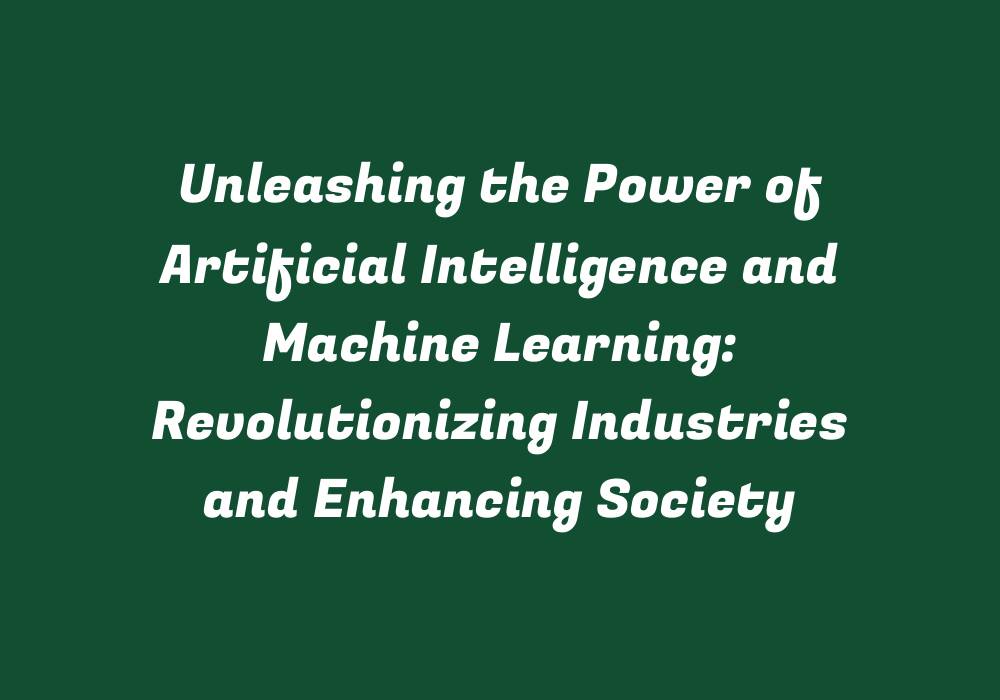Unleashing the Power of Artificial Intelligence and Machine Learning: Revolutionizing Industries and Enhancing Society
Introduction
The rapid advancements in technology have brought about a significant shift in the way we perceive and interact with our world. Artificial intelligence (AI) and machine learning (ML), two closely related fields, are at the forefront of this transformation. As their influence expands, AI and ML are reshaping various industries, revolutionizing our daily lives, and ultimately, enhancing society as a whole.
Artificial Intelligence: A Brief Overview
AI is generally defined as the simulation of human intelligence processes through machines, particularly computer systems that can learn, reason, and self-correct. It has become an integral part of numerous applications in fields such as healthcare, finance, education, and transportation. From voice recognition to automated translation, AI-driven technologies have made remarkable progress in improving the efficiency and accuracy of these tasks.
Machine Learning: A Closer Look
ML is a subset of AI that involves the study and application of self-learning algorithms, which can independently analyze data sets to make predictions and improve over time. This approach allows machines to adapt and learn without being explicitly programmed. Machine learning techniques have been implemented in diverse industries, from fraud detection and customer recommendations to autonomous vehicles and medical diagnostics.
Revolutionizing Industries
1. Healthcare
Healthcare is among the sectors that stand to benefit significantly from AI’s impact. ML-driven technologies are already being employed for tasks such as diagnosing diseases, personalized treatment recommendations, and monitoring patient health. By analyzing large amounts of medical data, these systems can identify patterns and trends previously undetected by human experts, ultimately leading to more effective treatments and better patient outcomes.
2. Finance
In the realm of finance, AI and ML have already been employed for tasks like risk management, fraud detection, and investment decisions. With their ability to analyze vast amounts of data in real time, these technologies can provide valuable insights into market trends and identify opportunities or threats more accurately than traditional methods. This enhances efficiency, reduces risks, and leads to smarter financial decision-making.
3. Transportation and Logistics
Self-driving vehicles are one of the most exciting applications of AI in transportation. The potential for improved road safety, reduced traffic congestion, and a more efficient use of resources is immense. Additionally, AI-enabled logistics systems can optimize routes, predict demand fluctuations, and reduce waste by ensuring that goods are transported in the most cost-effective manner.
4. Education
The field of education stands to gain from AI’s adaptive learning capabilities, which can provide personalized lessons tailored to individual students’ needs and abilities. By analyzing student performance data, these systems can identify areas where additional support is required or where a student may need to be challenged further. This ultimately leads to more engaging and effective learning experiences for all students.
5. Entertainment
In the entertainment industry, AI has already begun transforming our interactions with technology. Virtual assistants like Siri and Alexa are now commonplace in many homes, offering a range of services from setting alarms and providing weather updates to answering questions or playing music. Additionally, advancements in computer graphics have led to more realistic digital characters that can mimic human emotions and expressions, paving the way for the development of even more engaging media experiences.
Enhancing Society: The Broader Impact
1. Accessibility and Inclusion
AI-driven technologies have the potential to increase accessibility and inclusion by improving communication between people with diverse abilities and enhancing their overall experience in various settings, from education to entertainment. By developing interfaces that cater to specific needs and preferences, AI can help bridge gaps in understanding and create a more inclusive environment for everyone.
2. Job Creation and Skills Development
As AI-driven technologies continue to automate certain tasks, there is a concern that they may replace human workers, leading to potential job losses in various industries. However, this should not be seen as entirely negative. By freeing up time and resources currently dedicated to mundane or repetitive tasks, AI can create opportunities for workers to acquire new skills and focus on higher-level responsibilities, ultimately fostering a more dynamic workforce better equipped to adapt to the changing needs of industries in the future.
3. Environmental Sustainability
AI can also play a pivotal role in addressing environmental concerns by optimizing resource utilization and reducing waste. Smart grids powered by AI-enabled algorithms can analyze and predict power consumption patterns, enabling more efficient distribution and minimizing energy waste. Additionally, ML techniques can be employed to identify trends in water usage and pollution levels, ultimately leading to more sustainable practices that benefit both the environment and society as a whole.
Conclusion
The transformative impact of AI and ML on various industries and society at large is undeniable. As these technologies continue to evolve and expand their applications, we can expect further advancements in fields ranging from healthcare and finance to transportation and entertainment. By embracing the opportunities that come with these innovations, we have the potential to create a more efficient, equitable, and sustainable future for all.
